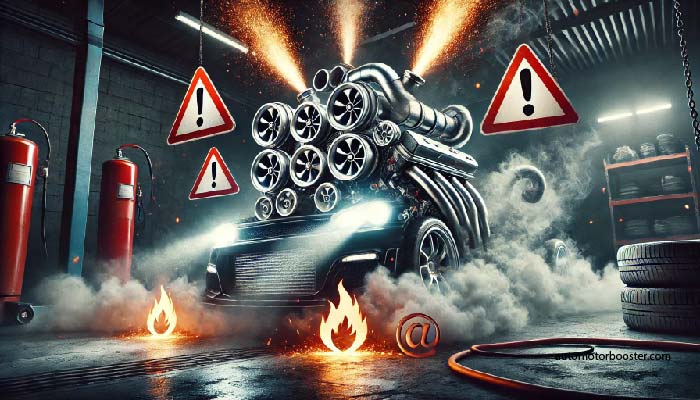
When it comes to enhancing engine performance, many car enthusiasts turn to boosting. By forcing more air into the engine, it can create more power, providing that thrilling surge of acceleration. However, overboosting — pushing the engine beyond its safe limits — can lead to several risks. This article will explain what overboosting is, the potential hazards it carries, and how to boost your engine safely.
What Is Overboosting?
Boosting refers to increasing the pressure of air intake into the engine, typically done using turbochargers or superchargers. When the boost level goes beyond the manufacturer’s recommended limits, it’s known as overboosting. While a slight increase in boost can enhance performance, overboosting forces the engine to operate under excessive stress, which can lead to major mechanical issues.
Why Do People Overboost Their Engines?
Many drivers overboost to get more power from their engines. By doing so, they aim to increase speed, acceleration, and overall engine performance. Sometimes, this practice is done for racing purposes or to improve the car’s power output. However, the risks can outweigh the benefits.
The Dangers of Overboosting
1. Engine Damage
One of the most significant risks of overboosting is engine damage. When the engine is forced to intake more air than it can handle, it can cause parts to fail. Excessive pressure can crack pistons, damage the cylinder head, or even blow the engine.
2. Higher Temperatures
Overboosting leads to increased temperatures. The added pressure makes the engine work harder, causing it to overheat. If not managed correctly, this can damage key components such as the turbocharger, exhaust valves, and even the oil.
3. Reduced Fuel Efficiency
While boosting can increase power, overboosting often leads to reduced fuel efficiency. The engine has to burn more fuel to handle the extra air pressure, leading to quicker fuel consumption. It can make regular driving more expensive.
4. Detonation and Knocking
Detonation or knocking occurs when the air-fuel mixture in the cylinder ignites prematurely. Overboosting can cause this problem because of the higher pressure and temperatures in the combustion chamber. Detonation leads to vibrations and can severely damage the engine’s internal components.
5. Stress on Engine Components
Engine parts like the pistons, rods, and crankshaft are designed to withstand specific pressures. Overboosting puts additional stress on these parts, which can cause premature wear and even catastrophic failure. Replacing these components can be costly.
How to Avoid Overboosting Risks
1. Use the Right Tuning
Ensure that your vehicle is tuned correctly for the level of boost you plan to use. Improper tuning can lead to overboosting, especially if you have added aftermarket parts like turbochargers. A professional tune will help manage the air-fuel ratio, ensuring safe engine performance.
2. Install a Boost Controller
A boost controller can help regulate the amount of pressure going to your engine. It prevents accidental overboosting by limiting the pressure to a safe, predetermined level. This small device can make a significant difference in keeping your engine running safely.
3. Regular Maintenance
Regular engine maintenance is crucial to detect any issues that may arise from boosting. Regularly check your turbocharger, intercooler, and other related components for wear and tear. Preventive maintenance can help you avoid expensive repairs later on.
4. Monitor Engine Temperatures
Keeping an eye on engine temperature is critical when boosting. If you notice the temperature rising unusually, it’s a sign that something might be wrong. High temperatures can lead to various issues, from oil breakdown to component failure.
5. Choose High-Quality Engine Parts
Using high-quality parts can minimize the risks associated with overboosting. Parts designed to withstand higher pressures will be less likely to fail. When upgrading or replacing engine parts, make sure to invest in reliable brands.
Conclusion
Overboosting your engine may sound appealing for the performance gains, but the risks often outweigh the benefits. While boosting can give your vehicle more power, pushing it too far can lead to severe engine damage, increased maintenance costs, and other problems. Following the tips provided here, you can safely boost your engine without falling into the trap of overboosting.
FAQs
1. What is overboosting?
Overboosting refers to increasing the boost pressure beyond the recommended limits, putting excessive stress on the engine.
2. Can overboosting damage my engine?
Yes, overboosting can lead to serious engine damage, including cracked pistons, overheating, and even engine failure.
3. How can I prevent overboosting?
You can prevent overboosting by installing a boost controller, ensuring proper engine tuning, and using high-quality engine components.
4. Does overboosting affect fuel efficiency?
Yes, overboosting can reduce fuel efficiency because the engine requires more fuel to match the increased air intake.
5. Is it safe to increase boost pressure slightly?
Slightly increasing boost pressure can be safe if done correctly and within the manufacturer’s recommendations. However, going too far leads to overboosting, which can cause problems.
If Like This Article Visit Our Website. Collect From Wekiapedia